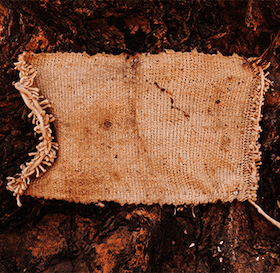Lycée Ba Aminata Diallo, Bamako, Mali
11 Dec 2019

Kani Sissoko, Affliction, Makoun, 2015, Digital photograph, Dimensions variable
How to navigate the intricacies of sexual violence in a patriarchal society such as Mali with “sutura” as a dominant cultural norm?
Comment naviguer dans les méandres de la violence sexuelle dans une société patriarcale telle que le Mali avec la « sutura » comme norme culturelle dominante?
Join Aissata Ba, Coumba Bah, Fatima Bocoum, Mariam Dramé Diallo, and Mariam Koné in conversation to explore ways of navigating the expectations of traditional societies such as Mali when dealing with sexual violence.
Mali, a predominantly Muslim country, is run on a strong patriarchal system. While women are the backbone of Malian society, speaking out about sexual violence is perceived as harmful to the common good. Thus, women and girls are psychologically groomed to cover, forgive, and bear their suffering through an unspoken cultural norm called « sutura ». They are expected to sacrifice their individuality and internalize their trauma to protect their family from any associated shame. According to UN Women, one woman in five will be raped at some point in her life. There is a pressing need to reverse women’s narrative, and refusing to see the next 1,846,000 Malian women undergo sexual abuse in silence is our duty.
Moderator:
Coumba Bah is a Communication Specialist with a focus on issues related to women’s and girl’s rights. She served as a Communications Officer at the UN Women in Mali from 2014 to 2017. She holds a Master’s degree in Agro-Food Science and Technology from Cornell University in the United States and holds a Bachelor of Science in Chemistry at Central State University in the state of Ohio, United States. She worked for ten years with multinationals in the food industry such as Cadbury Schweppes and Hoechst in the areas of R&D, Quality Control, Marketing, and Sales. In 2003, she returned to Mali to play her part in the development of her country. Bah manages Musoya, a firm specializing in communication and events. She was also a juror and mentor of several programs such as Demîsew Joyoro, Mali Dambé, Instant Tea, WomanTechMackers, the Young Women’s Association of Civil Society and Political Parties.
Panelists:
Aissata Ba holds a Master’s degree in Women’s Studies, Gender, and Sexuality from the State University of New York, a diploma from École Normale Supérieure of Bamako where she is a lecturer, and a Master’s degree in English and Arabic from the Université des Lettres et des Sciences Humaines of Bamako. Currently, as a research professor, she is coordinating a project aimed at improving the mental and maternal health of pregnant teenagers at the Université des Sciences, des Techniques et des Technologies of Bamako (USTTB). Ba is dedicated to servicing organizations which defend women’s rights in Mali. She has held several positions within the Women Association, Leadership and Sustainable Development (AFLED). She is also an active member of several organizations which seek to promote the positive development of young people, such as the Malian Association for School and Professional Orientation.
Entrepreneur, women’s rights activist and art curator, Fatima Bocoum has lived in the United States since 2006 after years spent in predominantly patriarchal societies, specifically China, Libya, Saudi Arabia, and Mali, which experiences have informed her current undertakings. She holds an Associate of Science in Fine Arts, Art History from Georgia State University in Atlanta and a Bachelor of Arts in Media and New Technologies from Fordham University in New York, where she continues to work in the startup ecosystem in Business Development and Partnerships. In 2018, she founded OpenLetr, a digital publication with the mission to break down societal and cultural barriers to emancipate women all while organizing artistic and cultural projects, the latest of which entitled Transfiguration was presented at Undercurrent Project a New York City-based boutique gallery. Bocoum’s work is articulated around women’s rights and empowerment, identity, and representation. As a survivor of sexual abuse, she was featured in Mounyou Ni Sabali?, a documentary by journalist Kaourou Magassa on sexual violence in Mali.
With ten years of experience in the promotion of human rights and sustainable development, Mariam Dramé Diallo holds a degree in political science from the Université de Montréal. She was the Sub-Saharan Africa Regional Coordinator of the International Knowledge Network on Women in Politics (iKNOW Politics). As the President of the Women Association, Leadership and Sustainable Development (AFLED), she works to rebuild peace and the damaged social fabric resulting from the war in northern Mali. Dramé Diallo is one of the young African leaders with a pan-African experience at the African Union. She is a member of the World Forum of Francophone Women, co-author of the Gender and Election Handbook published in Mali in 2013. Dramé Diallo is also a member of the UN Women’s Advisory Council. Merit Medalist, she earned a Women and Power Certificate at Harvard University Kennedy School of Government.
Mariam Koné is a comedian, activist, and entrepreneur. As a member of the network of Young Amnesty International Mali, she is responsible for external relations and recreational activities. In 2016, Koné made her debut on the radio to sensitize her audience on societal issues, and from there, in February 2019, she launched the Movement to Fight Violence Against Women and Girls (MLCVFF), a communication outlet which has for objective to combat all forms of violence against women and girls, and to promote, protect and defend the rights of women and girls. Today, Koné is the Vice President at (MLCVFF).